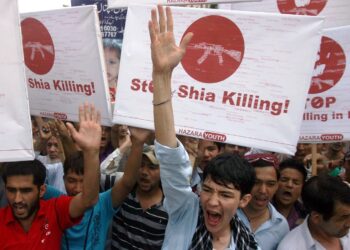Human Lives Human Rights: On March 26, 2015, Saudi Arabia launched an air strike against Yemeni territorial integrity, claiming to support resigned Yemeni President Abdurrahman Mansour Hadi, in what it called “Operation Decisive Storm” and “Operation Renewal of Hope”
The reasons for the attack, as reflected in a letter from the Saudi-led Arab League to the then Secretary-General of the United Nations and the President of the UN Security Council, are in response to a request from Yemeni President Mansour Hadi to support the country and its people against the aggression of the Houthi militias, who have always been the tools of foreign forces, who are constantly seeking to undermine the security and stability of Yemen.
These military attacks against Yemen provoked different reactions from some organizations and governments. Some expressed support for military operations in Yemen, while on the other hand, some expressed concern about the use of force and military intervention in Yemen, including the United Nations.
In all situations, Qatar, Kuwait, the UAE and Bahrain were allies of Saudi Arabia in this war, and countries such as Sudan, Morocco, Egypt, Jordan, etc. also cooperated with Riyadh by delivering military weapons for this war.
Since the beginning of the war, the Saudi coalition has besieged Yemen by sea, air and land. It bombed residential areas and military bases, as a result, civilians, especially innocent children, are constantly being attacked and bombed by Saudi-led coalition fighters.
According to many legal and political experts, there have been widespread international crimes in the Saudi coalition’s attacks on Yemen. Since these international crimes can be investigated and pursued from the perspective of international law, this article seeks to examine the wars and attacks carried out by coalition forces against the Yemeni people from the perspective of international law.
At the beginning of the analysis, while briefly referring to the start of the Yemeni crisis, the legitimacy of the war against Yemen is examined from the perspective of the UN Charter and the rules of international jurisprudence. Then, the crimes against humanity, war crimes and genocide of the Yemeni people are explained by the Saudi coalition forces and finally, the possibility and manner of international prosecution of these crimes in the International Criminal Court will be discussed.
The beginning of the crisis
Since 2011, the protests of the Yemeni people have entered a critical phase following the developments in Egypt, some of which have been called the Islamic Awakening and others the Arab Spring. Following the protests of the Yemeni people, Ali Abdullah Saleh, with more than 30 years of dictatorial rule, was forced to step down in 2011. With the interventionist decision of the Gulf Cooperation Council and with the support of the United States, Ali Abdullah Saleh’s deputy – Mansour Hadi came to power. But the failure of the new government to share power among the protesting groups led to increased discontent to the extent that the government was forced to sign a peace and partnership agreement with the opposition.
According to the agreement, the Yemeni president was obliged to provide the necessary grounds for the formation of a national unity government with the participation of opposition and revolutionary (Houthi) groups.
The presidential election was supposed to be held to run a two-year transition period, during which national talks on the legal process of transfer of power began, but contrary to the agreement, Mansour Hadi held an election on February 21, 2012, which was against the Yemeni constitution (Article 108 Constitution of Yemen). He was the only candidate, and finally, the election headquarters announced that Mansour Hadi had been elected president with 6 million votes.
It was while the opposition and revolutionary groups boycotted the election due to the non-competitive nature, specificity of the result and the foreign interference. However, with the intervention of the Persian Gulf Cooperation Council as the mediating body for the Arab regions, Mansour Hadi was appointed interim president for two years from 2012 to 2014, and new elections were to be held in 2015. During this period, national talks were taking place, when Mansour Hadi abruptly announced his resignation, and on February 21, 2015, while his presidency was coming to an end, he went to Aden and from there to Oman and then to Saudi Arabia, violating the laws of the country. He asked Saudi Arabia for help to return to power.
Subsequently, on March 26, 2015, a coalition of some Arab countries in the region, led by Saudi Arabia, launched airstrikes against Yemen under the name “Operation Decisive Storm” (Amaliyyat ‘Āṣifat al-Ḥazm). Fighter jets and ground forces from Egypt, Morocco, Jordan, Sudan, the United Arab Emirates, Kuwait, Qatar, Bahrain, and Academi (formerly called Blackwater) took part in the operation. Somalia also allowed the use of its military bases.
War crimes, with examples and emphasis on Yemen
War crimes are crimes committed in armed conflict that violate international humanitarian law. Customary international law, which is prior to international treaty law, has criminalized the acts committed during armed conflict. However, the entry of this category of crimes into the international treaty law was through the 1907 Hague Convention.
In the Rome Conference of 1998, several negotiations were held regarding war crimes and the ability of the International Criminal Court, which finally led to the approval of Article 8 of the Statute of the Court. According to the second paragraph of Article 52 of the Additional Protocol (I), attacks shall be limited strictly to military objectives. In so far as objects are concerned, military objectives are limited to those objects which by their nature, location, purpose or use make an effective contribution to military action and whose total or partial destruction, capture or neutralization, in the circumstances ruling at the time, offers a definite military advantage.
In case of doubt whether an object which is normally dedicated to civilian purposes, such as a place of worship, a house or other dwelling or a school, is being used to make an effective contribution to military action, it shall be presumed not to be so used. The one that was ignored in the military attack on Yemen.
Human Rights Watch emphasized in many reports that the Saudi coalition in Yemen has committed a war crime. In one of the reports, it was stated that the Human Rights Watch did not find any signs of military targets in Yemen. The coalition fighters do not distinguish between military and civilian targets.
According to customary international humanitarian law, hospitals and places where the sick and the wounded are collected, religious and historical places, and infrastructure facilities – are not military objectives, attack on them constitutes a war crime in both international and non-international armed conflicts. But in Yemen, we see that the Saudi coalition has repeatedly attacked Yemen’s hospitals, mosques, cultural and historical centers, as well as the country’s infrastructure.
On the other hand, in the field of using weapons, customary international humanitarian law has taken into account principles and regulations, and has banned the use of explosive biological chemical weapons, explosive bullets and the use of weapons that injure the body with small and invisible pieces.
In Yemen, according to Human Rights Watch, the Saudi coalition has used cluster bombs, so the war crime committed by this coalition is evident.
In accordance with Article 54 of the Additional Protocol (I) of Geneva, the Court’s statute has prohibited and criminalized starvation of civilians as a method of warfare. Paragraph 2 of Article 54 of the same protocol prohibits starving (forced starvation) by depriving them of the things that are necessary for their survival. Thus, Saudi regime in Yemen has used the methods that are prohibited.
In an interview with Reuters, the head of the World Food Program (WFP) affiliated to the United Nations, referring to the attacks of the Saudi coalition on Yemen, accused the coalition of hindering the humanitarian aid to the people of Yemen.
David Beasley said: Saudi Arabia should take the necessary measures to eliminate hunger and also treat the disease of the Yemeni people, which has arisen due to the military attack of this country on Yemen. A major part of the current humanitarian crisis in Yemen is the result of the approach taken by the coalition of Arab countries led by Saudi Arabia towards this country. People are struggling with hunger and malnutrition.
Two-thirds of the population of Yemen, nearly 19 million people, need emergency aid in some way. Four and a half million Yemeni children suffer from malnutrition. Forced transfer or deportation of a part of the country’s population is another example of war crimes. According to the elements of crimes of the ICC, the transfer, directly or indirectly, by the Occupying Power of parts of its own civilian population into the territory it occupies, or the deportation or transfer of all or parts of the population of the occupied territory within or outside this territory, constitutes a war crime in international armed conflicts. Mere act of provocation or establishment of facilities may also constitute to a war crime.


















